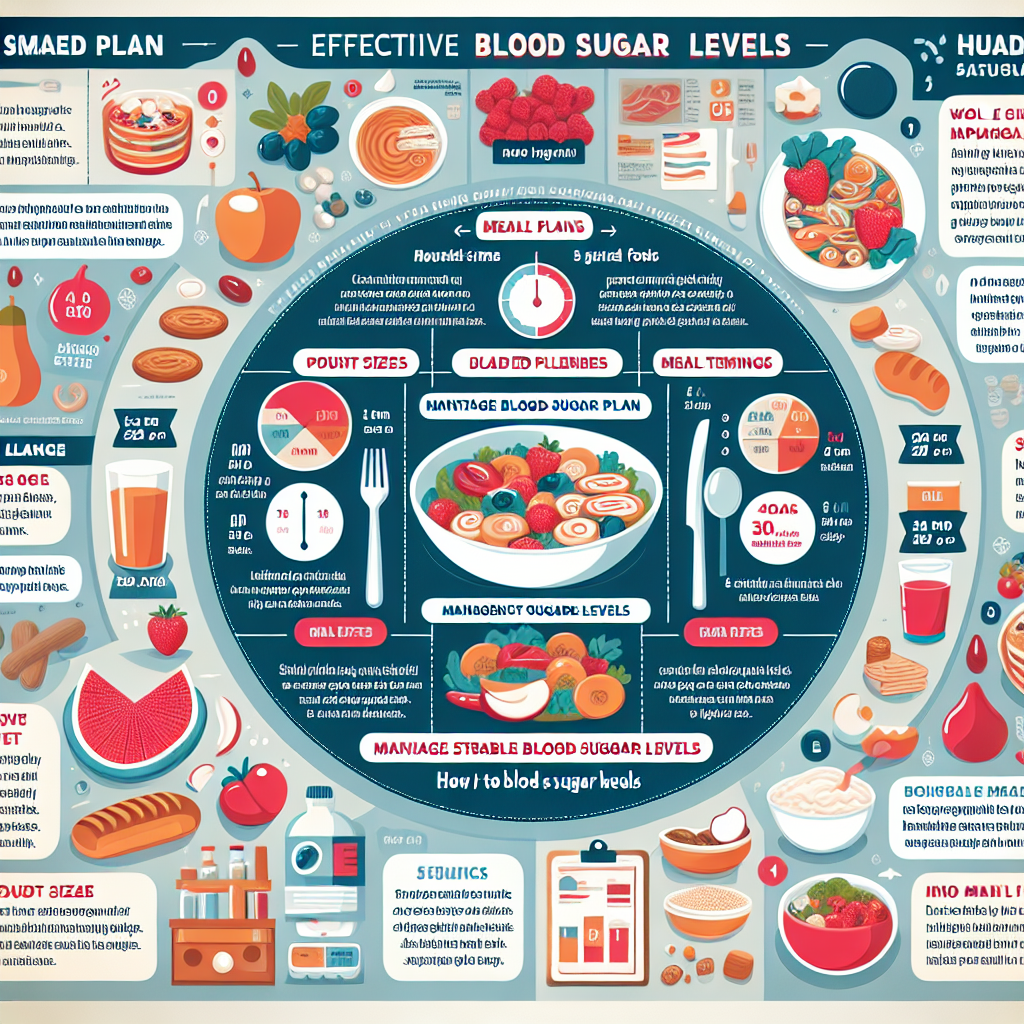Maintaining stable blood sugar levels is crucial for overall health, especially for individuals with diabetes or prediabetes. In this article, you will discover how meal plans can play a vital role in managing blood sugar levels effectively. By making smart and balanced food choices, you can ensure steady energy levels, prevent blood sugar spikes, and support your overall well-being. Let’s explore the power of meal plans in achieving optimal blood sugar control.

Understanding Blood Sugar Levels and Management
What are blood sugar levels?
Blood sugar levels refer to the amount of glucose (sugar) present in your blood. Glucose is the main source of energy for your body’s cells and is derived from the foods you consume, particularly carbohydrates. It is important to maintain stable blood sugar levels as both high and low levels can have adverse effects on your health.
The importance of managing blood sugar levels
Managing your blood sugar levels is crucial for overall health and well-being, especially if you have conditions like diabetes or prediabetes. Consistently high blood sugar levels can lead to complications such as heart disease, kidney damage, nerve damage, and vision problems. On the other hand, extremely low blood sugar levels can result in hypoglycemia, leading to weakness, confusion, and even unconsciousness. By actively managing your blood sugar levels, you can reduce the risk of these complications and promote optimal health.
Factors that affect blood sugar levels
Several factors can impact your blood sugar levels, including the types and amounts of food you eat, physical activity levels, stress levels, medication, and overall health. It is important to understand how these factors influence your blood sugar levels so that you can make informed choices and adjust your management plan accordingly.
Choosing the Right Foods
The role of carbohydrates
Carbohydrates play a significant role in your blood sugar levels as they are broken down into glucose during digestion. It is essential to choose complex carbohydrates, such as whole grains, legumes, and vegetables, as they are high in fiber and take longer to digest. This leads to a slower and steadier rise in blood sugar levels, preventing spikes and crashes.
Fiber-rich foods for blood sugar control
Including fiber-rich foods in your diet can help regulate blood sugar levels. Fiber slows down the digestion and absorption of carbohydrates, preventing rapid increases in blood sugar levels. Opt for fruits, vegetables, whole grains, and legumes that are high in fiber content.
The importance of protein and healthy fats
Protein and healthy fats are essential macronutrients that can help stabilize your blood sugar levels. Including lean sources of protein, such as chicken, fish, tofu, or legumes, in your meals can slow down the absorption of carbohydrates and prevent blood sugar spikes. Good sources of healthy fats include avocados, nuts, seeds, and olive oil, which can enhance satiety and regulate blood sugar levels.
Avoiding high glycemic index foods
High glycemic index (GI) foods are rapidly digested and cause a sharp increase in blood sugar levels. To maintain stable blood sugar levels, it is advisable to limit or avoid foods such as white bread, white rice, sugary beverages, and processed snacks. Instead, choose low GI alternatives like whole grains, sweet potatoes, and non-starchy vegetables.
Creating a Balanced Meal Plan
The plate method for portion control
The plate method is a simple technique that can help you control portion sizes and balance your meals. Divide your plate into sections: half for non-starchy vegetables, one-quarter for lean protein, and one-quarter for whole grains or starchy vegetables. This method ensures a balance of nutrients and can promote stable blood sugar levels.
Balancing macronutrients in each meal
Including a combination of carbohydrates, protein, and healthy fats in each meal can help regulate blood sugar levels. Aim for a balanced intake of these macronutrients, such as pairing a serving of whole grains with lean protein and vegetables, or incorporating healthy fats like avocado or nuts into your meals.
Including a variety of food groups
To ensure you receive a wide range of essential nutrients, it is important to include foods from all food groups in your meal plan. This includes fruits, vegetables, whole grains, lean proteins, and healthy fats. Each food group contributes different nutrients that play a role in maintaining stable blood sugar levels and overall health.
The benefits of regular meal times
Eating meals at consistent times throughout the day can help regulate blood sugar levels. This approach allows your body to anticipate and prepare for the incoming nutrients, reducing the likelihood of blood sugar spikes. Try to establish a routine that includes breakfast, lunch, dinner, and planned snacks to maintain steady blood sugar levels.
Tips for meal planning
Meal planning can be an effective strategy for managing blood sugar levels. Plan your meals in advance, including a variety of nutrient-rich foods. Incorporate batch cooking, where you prepare larger quantities of meals and store them for later use. This can help you stay on track with your meal plan and avoid making impulsive food choices.
Specific Meal Plans for Blood Sugar Management
Meal plan for people with diabetes type 2
For individuals with diabetes type 2, a balanced meal plan includes portion-controlled meals with a focus on whole grains, lean proteins, and non-starchy vegetables. It is important to distribute meals throughout the day and include regular snacks to maintain stable blood sugar levels. Consult a registered dietitian or healthcare professional to create a personalized meal plan that caters to your specific needs.
Meal plan for people with diabetes type 1
Managing blood sugar levels for individuals with diabetes type 1 often involves insulin therapy and precise meal planning. A meal plan for type 1 diabetes typically includes consistent carbohydrate intake, balanced with appropriate insulin dosages. It is critical to work closely with a healthcare professional or registered dietitian to develop a personalized meal plan that meets your specific requirements.
Meal plan for prediabetes
If you have been diagnosed with prediabetes, a meal plan that focuses on whole foods and portion control can help regulate blood sugar levels and prevent progression to diabetes. Emphasize a variety of fruits, vegetables, whole grains, lean proteins, and healthy fats. Regular physical activity and weight management can also be beneficial for managing prediabetes.
Meal plan for gestational diabetes
Gestational diabetes affects pregnant individuals and requires careful meal planning to maintain stable blood sugar levels for both you and your baby. A meal plan for gestational diabetes often involves tracking carbohydrate intake, ensuring balanced meals, and frequent blood sugar monitoring. Consult with your healthcare provider or a registered dietitian who specializes in gestational diabetes for personalized guidance.

Snacks and Blood Sugar Control
Choosing healthy snacks
When selecting snacks, opt for nutritious options that provide a balance of carbohydrates, protein, and healthy fats. Good snack choices for blood sugar control include Greek yogurt with berries, apple slices with nut butter, or raw vegetables with hummus. Avoid sugary and processed snacks that can lead to blood sugar spikes.
Snack ideas for blood sugar regulation
If you feel the need for a snack between meals, consider incorporating foods that have a low glycemic index rating. Some examples include celery with peanut butter, cottage cheese with cherry tomatoes, or a handful of almonds with a piece of fruit. These options can help keep your blood sugar levels stable and provide sustained energy.
The Role of Physical Activity
How exercise affects blood sugar levels
Physical activity can have a significant impact on blood sugar levels. Exercise helps your muscles use glucose for energy, reducing the amount of glucose in your blood and improving insulin sensitivity. Regular physical activity can lead to more stable blood sugar levels and better overall blood sugar management.
Incorporating physical activity into meal plans
To maximize the benefits of exercise on blood sugar control, try incorporating physical activity into your daily routine, especially after meals. Going for a brisk walk or engaging in moderate-intensity aerobic exercises can help lower blood sugar levels. Speak with your healthcare provider about suitable exercise recommendations, particularly if you have any underlying health concerns.
Monitoring and Adjusting Meal Plans
The importance of monitoring blood sugar levels
Monitoring your blood sugar levels regularly is crucial for managing your meal plan effectively. Regular monitoring allows you to understand how different foods, activities, and medications impact your blood sugar levels. It helps you identify patterns and make necessary adjustments to your meal plan or treatment regimen.
Seeking professional guidance
It is recommended to seek guidance from a registered dietitian or healthcare professional when managing blood sugar levels through meal planning. They can help you create a personalized meal plan based on your specific needs, provide ongoing support, and monitor your progress. Collaborating with a professional can enhance your understanding of how to manage blood sugar effectively.
Making necessary adjustments to meal plans
As your body and health needs change, it may be necessary to make adjustments to your meal plan. Monitoring your blood sugar levels regularly can help you identify patterns and make informed decisions. If you notice consistent high or low blood sugar readings, consult with a healthcare professional or registered dietitian to make appropriate adjustments to your meal plan.
Eating Out and Social Situations
Tips for dining out with blood sugar control in mind
When dining out, there are several strategies you can employ to maintain blood sugar control. Choose restaurants that offer healthier options and have nutritional information available. Opt for dishes that are grilled, baked, or steamed instead of fried. Request sauces and dressings on the side to control portion sizes and choose water or unsweetened beverages instead of sugary options.
Navigating social events while managing blood sugar levels
Attending social events and gatherings can present challenges when managing blood sugar levels. Plan ahead by eating a balanced meal or snack before the event, so you are less tempted by unhealthy options. If necessary, bring your own dish to share that aligns with your nutritional needs. Communicate your dietary restrictions or preferences to the host, so they can accommodate your needs.
Additional Strategies for Blood Sugar Management
Importance of stress management
Stress can have a significant impact on blood sugar levels. When you experience stress, certain hormones are released, which can cause blood sugar to rise. Implement stress management techniques such as regular exercise, deep breathing exercises, meditation, or engaging in activities you enjoy. By managing stress, you can support stable blood sugar levels.
The role of adequate sleep
Getting enough quality sleep plays a vital role in blood sugar management. Lack of sleep or poor sleep quality can affect hormone levels, leading to imbalances that impact blood sugar control. Aim for 7-8 hours of uninterrupted sleep each night to support overall health and stable blood sugar levels.
Unhealthy habits to avoid
Certain habits can negatively impact blood sugar levels and hinder effective management. Avoid excessive consumption of sugary beverages, processed foods, and snacks high in refined carbohydrates. Limit alcohol intake, as it can interfere with blood sugar regulation. Smoking is also detrimental to blood sugar control and overall health, so quitting is highly recommended for better glucose management.
The benefits of hydration
Staying hydrated is essential for optimal blood sugar control. Water helps your body maintain proper functioning, including the regulation of blood sugar levels. Aim to drink an adequate amount of water throughout the day, and consider replacing sugary beverages with water or unsweetened options to avoid unnecessary spikes in blood sugar.
Conclusion
Managing blood sugar levels is a crucial aspect of maintaining overall health, especially for individuals with conditions like diabetes or prediabetes. By understanding the factors that affect blood sugar levels, choosing the right foods, creating a balanced meal plan, incorporating physical activity, and making necessary adjustments, you can effectively control and manage your blood sugar levels. With the guidance of healthcare professionals and the adoption of healthy habits, you can take control of your blood sugar levels and improve your overall well-being.

